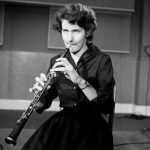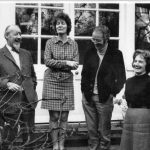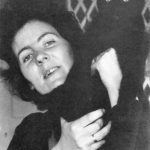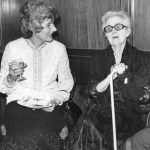By James Turnbull, August 2023
“The sudden death of Janet Craxton has caused dismay and sorrow to all who knew her, particularly among those who had worked with her in any professional capacity. They sensed that beneath an easy going and unassuming manner there lay a rigorous discipline that had brought her to the position she occupied. This doesn’t mean that her success was due to hard work alone, she was really gifted, coming as she did from a gifted family.”
These are the words of the composer Lennox Berkeley in a tribute to Janet Craxton. Broadcast on BBC Radio 3 following her unexpected death at the age of 52 in 1981, over four decades have passed since and as part of my Edison Fellowship I am exploring the legacy left behind by this exceptional musician. The British Library sound archive unlocks so much of Craxton’s recorded work, shedding light on her legacy for oboists, composers, and concertgoers amongst others. Janet died at the very height of her powers, but her dedication to the highest standards of performance and pedagogy continue to shine brightly through the generations of musicians who have followed her.
In this exploration of her legacy, her recorded interviews and performances held within the British Library sound archives give a wonderful opportunity to remember this special person. While her commercial recordings are sparse, there are many fantastic recordings made for broadcast by the BBC that are preserved within the British Library collections. In a broadcast by BBC Radio 3 called ‘Janet Craxton: A Growing Legacy’ the broadcaster Anthony Burton asked the oboist Evelyn Rothwell what constitutes Craxton’s legacy. In reply Rothwell said “Well, sadly she didn’t make enough recordings for that to be a serious legacy alas. I think her teaching, her pupils, will teach other pupils and they will teach others and I think that’s where her legacy is.”
ABOUT JANET CRAXTON
Having trained under Helen Gaskell at the Royal Academy of Music and Pierre Bajeux at the Paris Conservatoire, Janet Craxton embarked on a unique journey including a busy life as an orchestral oboist, solo recitals, chamber music collaborations, and pedagogical contributions. Notably, she played principal roles within esteemed ensembles including the Hallé Orchestra (1949-52), the London Mozart Players, the BBC Symphony Orchestra (1954-63), the London Sinfonietta (1969-81), and the Royal Opera House, Covent Garden (1979-81).
Janet’s qualities as a chamber musician were equally remarkable, highlighted by her membership in the London Oboe Quartet, Leonardo Wind Quintet and London Concertante amongst others. An advocate for contemporary music, she premiered Vaughan Williams’ Ten Blake Songs with Wilfred Brown in 1958 and inspired the composition of numerous works in the years that followed, thus contributing significantly to the oboe repertoire.
Her influence resonated beyond her performances. Janet’s teaching was highly respected, characterised by a blend of rigorous discipline and empathetic understanding for her students. Her professorship at the Royal Academy of Music, which began in 1958, coincided with her tutoring the National Youth Orchestra of Great Britain’s oboe section. Over two decades, she cultivated her own pedagogical approach, leaving an indelible mark on British oboe playing. Janet received numerous accolades such as the Musicians Company’s Cobbett Medal for Services to Music (1975), the Composer’s Guild Award as Instrumentalist of the Year (1978), and posthumously, the Incorporated Society of Musicians’ Distinguished Musician Award (1981).
Janet in Her Own Words: Exploring Her Perspective on Oboe Repertoire
One of the most intriguing broadcasts by Craxton in the British Library sound archives is a programme where she examines the nature and history of the oboe and chamber music for BBC Radio. Hearing Janet speak in her own words about what she believed to be crucial in the development of the oboe repertoire is particularly revealing. Her love of Mozart shone through in a striking manner. Speaking on the matter, Janet said “The Oboe Quartet is amongst Mozart’s most perfect works. Most oboists play this masterpiece many, many times yet I have never heard of one who has become even temporarily tired of it and that is a stiff test for any work”. Janet also spoke of the huge gap in chamber repertoire for oboe that exists between Mozart and Britten. To the listener it is clear that Craxton believes the oboist Friedrich Rahm to be crucial in inspiring Mozart to push the boundaries with his Oboe Quartet. Interestingly she highlights Leon Goossens and Heinz Holliger as two similarly virtuosic players who had enabled a renaissance of chamber music repertoire for the oboe. In this broadcast she says “In the twentieth century oboists were extremely fortunate when Leon Goossens arrived to lead the instrument back to the solo and chamber music path”. She also mentions Heinz Holliger “who virtually stands on a plain of his own, technically speaking, rather as I imagine Herr Rahm had done for 200 years earlier”. What follows in this broadcast is how vital it is for oboists to encourage the creation of new repertoire for the oboe. In particular, Craxton highlights how the London Oboe Quartet have encouraged colleagues to write for oboe and string trio.
It is fitting given Craxton’s reverence for Mozart’s contributions to the oboe repertoire that colleagues such as Anthony Camden remembered Janet in her obituary by highlighting her own exceptional performances of Mozart’s music. Camden says “if one could single out one piece from the classical repertoire which Janet Craxton performed with great distinction, it must surely be the Mozart Oboe Quartet in F major. In this music, she demonstrated her sweetness of tone and her great subtlety and flexibility of phrasing which complimented her natural poise and musicianship”.
In the British Library collection is also a disc compiled by the BBC called ‘The Art of Janet Craxton’. In the notes for this recording, Evelyn Rothwell also wrote of Janet’s approach to Mozart, saying ‘nobody played this work as she did, with such impeccable musicality and technique. The rhythmic pulse is always there – vital and springy – phrasing is technically finished and so musical, nothing is overdone everything seems exactly right’. Interestingly these words reflect aspects of Janet’s playing style that were distinctive to others who heard her and will be touched upon later.
There are other examples of how Janet’s view of herself is often closely aligned with how others perceived her. In the BBC Radio programme ‘Janet Craxton: A Growing Legacy’ Gareth Hulse (a student of Janet’s) said “If you think of Janet, you think of someone who, as well as being a marvellous human being, had an attitude towards playing music. Very self disciplined, very self critical and honest and just trying to serve the music.” Interestingly, this humble quality is also visible elsewhere away from her recorded legacy. Craxton wrote an article for the International Double Reed Society in which she modestly acknowledges areas of technique in which she still hopes to make progress. Her candid admission of not having mastered flutter tonguing is a prime example of the humility she possessed. She wrote “I must begin by confessing that I have had more than a few doubts about writing this article as, although I am very interested in the new techniques and effects possible on the oboe, there are many of them I have not yet succeeded in mastering.” (Janet Craxton’s article on Contemporary Oboe Technique for IDRS Magazine V1.1). Janet Craxton’s perspective, so beautifully preserved within the interviews held at the British Library, further enriches our comprehension of her legacy.
Playing Style
By hearing the substantial collection of recordings kept at the British Library featuring Janet Craxton, it is particularly striking how consistent her playing was in its exceptional qualities. One of the most fascinating contributions was a programme called ‘Mining the Archive’ in which broadcaster Susan Sharpe explored so many diverse examples of the recordings that remain. In particular the first broadcast performance of Britten’s Two Insect Pieces was included as well as Michael Berkeley’s Oboe Concerto with the BBC Northern Symphony Orchestra. Another recording that stood out particularly was that of Poulenc’s Oboe Sonata. This was recorded on 7th April 1981 and broadcast on 6th June of the same year, little over a month before Janet died.
Across the range of recordings in the collection, there were certain striking qualities about her playing style. The flexibility with which vibrato was used is something that stretched the majority of Janet’s recorded output. There was a clear commitment to phrasing. The way in which Janet could change the colours and emotional direction of a phrase by using a subito piano to draw the listener in was also something that was found in numerous recordings. The other aspect of her playing style that seemed very clear was the incredible staccato tonguing she possessed. In fact the range and variety of articulation she used was particularly notable. It enabled such lively interpretations in music such as that of her husband, Alan Richardson. It could also be used for striking effect in Lutoslawski’s Epitaph (written for Janet in memory of Alan Richardson) or Britten’s Temporal Variations.
Solo Performances
The recordings of Janet’s solo performances were fascinating to hear. A significant facet of her musical and personal life involved giving recitals alongside her husband, the composer Alan Richardson. The archive houses an interview where the duo delve into their performances in various music societies across the UK. There are notable landmark performances such as the first broadcast of Britten’s Two Insect Pieces and his Temporal Variations. Her performances of Richardson’s music are also notable and in one of the recorded interviews, Richardson says to Craxton about writing with a particular musician in mind. He elaborates “In recent years if I’ve written anything for the oboe, very naturally I’m delighted to say I’ve been thinking of you’. Another interesting exchange between the couple was regarding musical tastes. Richardson said “Well because of the difference in our ages, Janet is more advanced than I am because there is a lot of contemporary music that I cannot abide, for any sake and she knows that. On the other hand you see she plays so much music of an avant-garde nature and by playing it, you come to know it and realise that if there is anything or nothing in it as the case may be”. Janet replied “Yes I have to be very careful about which concerts I ask my husband to come to as I know sometimes there are pieces in the programme that he’s not going to like”. Upon the death of Richardson, Craxton asked Witold Lutoslawski to write a piece in memory of him, noting that Lutoslawski was one of the few living composers that she saw him enthused by following a concert by the London Sinfonietta. The resulting Epitaph is one of the most substantial commissioned works left by Janet Craxton to the solo repertoire and the premiere broadcast also features in the British Library Collection.
Janet’s exploration of the oboe’s concerto repertoire left an significant mark in the Library collections. In particular performances of Malcolm Arnold’s Concerto, Michael Berkeley’s Concerto, Rutland Boughton’s Oboe Concerto with the BBC Concert Orchestra, and the William Alwyn’s Concerto recorded with the BBC Welsh in 1970 were fascinating to hear. These performances not only exemplify Janet’s virtuosity but also underscore her dedication to furthering the role of the oboe as a solo instrument.
Chamber Music
Janet Craxton’s contributions to the chamber music repertoire for oboe were also substantial. Perhaps the most prominent examples in this collection are the works written for, or premiered by, the London Oboe Quartet. These include the music of Lutyens, Maconchy, Lefanu and Lennox Berkeley. Having heard several of the oboe quartet recordings elsewhere, I particularly enjoyed discovering the recordings for Oboe and Flute that Craxton made with Douglas Whittaker. In particular the Impromptu No.1 by Thea Musgrave (premiered on 10th April 1967 at the Wigmore Hall by Whittaker and Craxton) and Richard Rodney Bennett’s Conversations for oboe and flute. The performances in these recordings were absolutely spellbinding and both players seemed merge into one voice with committed performances that featured such exceptional precision. Within the British Library collection is also the broadcast premiere of Martinu’s Oboe Quartet and recordings of the Ten Blake Songs that Vaughan Williams composed for Janet. When compared with some of the performances that Craxton gives in the London Oboe Quartet, there is such amazing breadth in the collection.
Orchestral Experience
Following the completion of her studies, Janet became the Principal Oboe of Hallé Orchestra in Manchester. As mentioned previously she held several influential positions within great orchestras in the UK and was the first female principal in any woodwind section of the BBC orchestras when she took her place in the BBC Symphony Orchestra in 1954. Within the British Library collection this aspect of Janet’s legacy was spoken about by the clarinetist Thea King during the programme ‘Janet Craxton: A Growing Legacy’. King referred to Craxton as a pioneer in the 1950s saying “She was probably the only female in the wind”. It was in 1963 that Craxton decided to become a freelance player so that she could teach and play chamber music more regularly but despite this she did return to orchestral life when she became co-principal in the orchestra of the Royal Opera House.
Once again it was hearing Janet Craxton speak about others that often revealed so much about her own priorities in performance. Speaking of the conductor Rudolf Schwartz, she said “He is one of my ideals as a conductor in that he is always trying to reach the truth of the music and his interpretation is always based on that rather than the feeling of adding his personality to the music.”
Expanding the Repertoire: Janet Craxton’s Collaboration with Composers
Janet Craxton’s legacy extends beyond her own performances, encompassing her crucial collaborations with composers that enriched the oboe’s repertoire. She played a pivotal role in expanding the oboe repertoire through working with composers such as John McCabe, Oliver Knussen, Elizabeth Maconchy, Lennox Berkeley, Michael Berkeley, Ralph Vaughan Williams, Richard Rodney Bennett, and Thea Musgrave.
Speaking after Janet’s death, Lennox Berkeley said “From the composer’s angle, we were all rewarded by her astonishing virtuosity and by the sheer beauty of the sound she could achieve. Janet was not only a great performer she was a great teacher as well and her influence on younger players could be clearly felt when one heard them play. It went further, I think, than a purely musical influence. We were all aware of her goodness as a human being. Above all she was disinterested, never thinking of herself but always of the music, warning fellow performers of pitfalls (often humorously described) and giving all concerned confidence and trust in each other. Her colleagues, her pupils and her friends will never forget her.”
Another fascinating insight into the impact Janet had upon the oboe repertoire was highlighted in the interview with Martin Butler who wrote a work for Nicholas Daniel (a student of Janet’s) to premiere. In the interview Anthony Burton asks “Would it be fair to say that its a piece that you couldn’t have written as you’ve written it if it hadn’t been for Janet?” Martin Butler replies “Yes I think that is fair” elaborating that he was “feeling her influence from afar” through the experience of Nicholas Daniel and his playing. Butler states his work Chaconne is “A piece for her through him.”
Teaching Legacy
Outside of the oboe repertoire that Janet has commissioned or inspired it is arguably her work as a teacher that has the potential to reach the most people either directly or indirectly. Her legacy as a professor at the Royal Academy of Music is honoured with a dedicated room in her name within the York Gate building. Her teaching at the Academy and her coaching with the young musicians of the National Youth Orchestra enabled her to influence and nurture generations of oboists who have gone on to hold major roles themselves within the music profession.
Amongst her earliest students were Celia Nicklin, Valorie Taylor, Catherine Smith and Irene Pragnell. She taught numerous oboists such as George Caird, Douglas Boyd, Tony Allcock, Helen Powell, Graham Salter and Gareth Hulse. Her death came when Nicholas Daniel, the recipient of the 1980 BBC Young Musician of the Year award, had been studying with Janet for just a year. The impact Janet had upon all of these musicians was clear to see and Nicholas Daniel even dedicated an entire recording to her legacy in his recording ‘For Janet’ released by Chandos Records.
It is in the broadcasts collected by the BBC in memory of Janet that some of her legacy is easiest to recognise. George Caird remarked “It was the standard that she brought to everything. Only the best will do and the best has to come from within yourself and she applied that to teaching you the oboe.” When asked if Janet’s pupils sound alike George Caird responded “No, but I think there is a quality of ‘Janetness’ about the way certain people play and I think that relates to the intensity in the sound that she had”.
Remembering Janet in the 21st Century
My own personal journey in discovering more about Janet Craxton began over thirty years ago when I started the oboe at primary school. My first teacher told me how remarkable Janet was both as a teacher and as a performer and encouraged me to listen to her recordings. In the years that followed I went onto play works she had inspired and took lessons with students of Janet’s too. Her legacy to me feels strongest in the music she has championed as well as the impact she has had on the students she taught.
I am extremely grateful to the support and time given to me by the British Library and Jonathan Summers in helping me use the sound collections to uncover more facets of Janet’s impact on oboe playing in the UK. In the coming months, the research from this project will be added to by several interviews and articles which will be found on this website (JanetCraxton.org)




